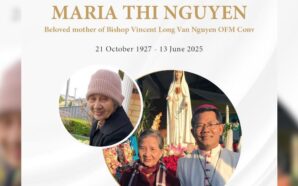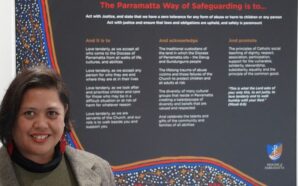Homily for Trinity Sunday
15 June 2025
Readings: Proverbs 8:22-31; Psalm 8:4-9; Romans 5:1-5; John 16:12-15
Listen at soundcloud.com
Today is Trinity Sunday. It’s customary for the preacher on this day to admit that the Trinity is a mystery and then to move on as deftly as possible. This year we mark the 1700th anniversary of the Council of Nicaea which attempted to resolve some of the more esoteric arguments about the Trinity. Back in 325, the Roman emperor Constantine who was the first emperor to have converted to Christianity was growing a little weary of the esoteric theological debates going on about the Trinity. Such debates tended to be disruptive of public order. He’d already made a couple of efforts to bring bishops together from various parts of the empire in an attempt to quell disputes. He summoned a couple of hundred bishops to Nicaea which was near his headquarters at Nicomedia. He told delegates that they would enjoy the climate at Nicaea which was next to a majestic lake. It’s the site of the modern city of Iznik in Turkey. He also told the delegates that he intended to ‘be present as a spectator and participator in those things which will be done’. No doubt the emperor’s presence encouraged the attendance of the delegates and helped them come to some resolution of the issues at hand.
Things had come to a head with a very bright priest named Arius who was teaching that Christ was inferior or subordinate to the Father, having been created by the Father out of nothing. Those sympathetic to Arius have long argued that Arius ‘was not merely preoccupied by logic and that he had a warm concern to present Christians with a picture of a Saviour who was like them and participated in human struggles towards virtue; his Christ was part of the created order, not simply an image of God’.[1]
Emperor Constantine proposed that the Son was of one substance (homoousios) with the Father. All but two of the delegates voted in support. Whenever we recite the Nicene Creed nowadays at Sunday mass we affirm that the Lord Jesus Christ is ‘begotten, not made, consubstantial with the Father’.
To mark the 1,700th anniversary of Nicaea, the Church’s International Theological Commission has published a 40,000 word document on ‘Jesus Christ, Son of God, Saviour’.[2] Last Saturday, Pope Leo returned to his old university in Rome for an ecumenical symposium on Nicaea. One of the endearing things about our new pope is that he is precise with his language, sparing with quotes, and ever hopeful of unity and communion. He went to the nub of the matter when he quoted this line from the International Theological Commission observing that the year 2025 represents ‘an invaluable opportunity to emphasise that, what we have in common is much stronger, quantitatively and qualitatively, than what divides us. Together, we believe in the Triune God, in Christ as truly human and truly God, and in salvation through Jesus Christ, according to the Scriptures read in the Church and under the guidance of the Holy Spirit. Together, we believe in the Church, baptism, the resurrection of the dead, and eternal life.’ [3]
Affirming our belief in Christ as truly human and truly God, Paul tells us in today’s second reading from his letter to the Romans that we can not only boast about looking forward to God’s glory but we can also boast about our sufferings which bring patience, perseverance, and a hope which is not deceptive ‘because the love of God has been poured into our hearts by the Holy Spirit which has been given us’.
During the week, I happened to stumble upon an interview on the ABC’s Australian Story where Leigh Sales was interviewing rock singer Nick Cave. I knew very little about Cave – neither his music nor his life. But I had always been intrigued by a rock singer who would often appear meticulously groomed in a coat and tie. He spoke about the inconsolable grief following upon the untimely deaths of his two sons. Leigh Sales treaded gently but persistently. Let me quote Cave at some length (with minor edits) reflecting on the death of his 15 year old son Arthur who died in 2015 falling from a cliff near home after taking LSD:
‘This is really quite a complicated thing, but the sort of void that was left, that there was a kind of rushing in of meaning that came into that void in all sorts of different ways that allowed me to see the world in a different way. It allowed me to be much more basically compassionate towards the human predicament, less embittered. It was a kind of counter factual response. It in fact, rather than made me bitter, it did the opposite in some way: it made me much more connected to people . I’ve always had a religious temperament, even as a child. I had no need for it, being drug addicted for a couple of decades. I had a great interest in this sort of stuff but no need for it. And I think after Arthur died, not immediately, but you know it’s been quite a while now, but rather than feeling anger towards that system for rejecting that sort of stuff, I felt a slow movement towards a religious life that I found extremely helpful, with a kind of widening thing that’s happened in my life.’[4]
Out of suffering and loss came compassion, not bitterness; not a void, but a world of meaning; not a narrowing into self but a widening into the world’s embrace. Today we celebrate God as one of us – with Jesus who knew suffering unto death and with the Spirit who has poured the love of God into our hearts. The International Theological Commission puts it this way: ‘To proclaim Jesus our salvation on the basis of the faith expressed at Nicaea does not ignore the reality of humanity. It does not turn away from the sufferings and upheavals that plague the world and today seem to undermine all hope. On the contrary, it confronts these troubles by professing the only possible redemption, won by the one who experienced the violence of sin and rejection, the loneliness of abandonment and death, and who, from the very abyss of evil, rose to bring us too in his victory to the glory of the resurrection.’[5]
Let’s celebrate the Trinity – the Father who is creator of heaven and earth; Jesus who suffers as one of us; and the Spirit who pours the love of God into our hearts.
[1] Diarmaid MacCulloch, A History of Christianity, Allen Lane, 2009, p.213.
[2] https://www.vatican.va/roman_curia/congregations/cfaith/cti_documents/rc_cti_doc_20250403_1700-nicea_en.html
[3] Jesus Christ, Son of God, Savior, n. 43, quoted at https://www.vatican.va/content/leo-xiv/en/speeches/2025/june/documents/20250607-simposio-nicea.html
[4] See https://www.abc.net.au/news/2025-04-17/nick-cave-with-leigh-sales/105188952
[5] https://www.vatican.va/roman_curia/congregations/cfaith/cti_documents/rc_cti_doc_20250403_1700-nicea_en.html, #122.








